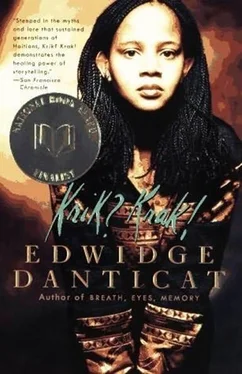"I will answer if I can."
"My mother was old régime," she said. "She was a journalist. For a newspaper called Libèté in Port-au-Prince."
"She came to Ville Rose?"
"Maybe. Or some other town. I don't know. The people who worked with her in Port-au-Prince think she might be in this region. Do you remember any shootings the night of the coup?"
"There were many shootings," I said.
"Did you see any of the bodies?"
"My grandmother and me, we stayed inside."
"Did a woman come to your door? Did anyone ever say that a woman in a purple dress came to their door?"
"No."
"I hear there is a mass burial site," she said. "Do you know it?"
"Yes. I have taken journalists there."
"I would like to go there. Can you take me?"
"Now?"
"Yes."
She pulled some coins from her purse and placed them on the table.
"I have more," she said.
From the back pocket of her jeans, she took out an envelope full of pictures. I ran my fingers over the glossy paper that froze her mother into all kinds of smiling poses: a skinny brown woman with shiny black hair in short spiral curls.
"I have never seen her," I admitted.
"It is possible that she arrived in the evening, and then the coup took place in the middle of the night. Do you know if they found any dead women the day after the coup?"
"There were no bodies," I said. "That is to say no funerals."

I heard my grandmother's footsteps even before she reached the door to the yellow house.
"If you tell her that I'm here, I can't go with you," I said.
"Go into the next room and stay there until I come for you."
My grandmother knocked once and then a second time. I rushed to the next room and crouched in a corner.
The plain white sheets that we usually covered the bed with had been replaced by a large piece of purple cloth. On the cement floor were many small pieces of cloth lined up in squares, one next to the other.
"Thank you for sending me the needles," I heard Emilie say to my grandmother. "I thought I had packed some in my suitcase, but I must have forgotten them."
"My old eyes are not what they used to be," my grandmother said, in the shy humble voice she reserved for prayers and for total strangers. "But if you need some mending, I can do it for you."
"Thank you," said Emilie, "but I can do the mending myself."
"Very well then. Is my granddaughter here?"
"She had to run off," Emilie said.
"Do you know where she went?"
"I don't know. She was dressed for a very fancy affair."
My grandmother was silent for a minute as her knuckles tapped the wood on the front door.
"I will let you rest now," said my grandmother.
"Thank you for the needles," said Emilie.
Emilie bolted the door after my grandmother had left.
"Is there a way we can leave without her seeing you?" She came into the room with a flashlight and her American passport. "You might get a little beating when you go home."
"What are all these small pieces of cloth for?" I asked.
"I am going to sew them onto that purple blanket," she said. 'All her life, my mother's wanted to sew some old things together onto that piece of purple cloth."
She raised a piece of white lace above her head. "That's from my mother's wedding dress."
Grabbing a piece of pink terry cloth, she said, "That's an old baby bib."
Tears were beginning to cloud her eyes. She fought them away fast by pushing her head back.
"Purple," she said, "was Mama's favorite color."
"I can ask my grandmother if she saw your mother," I said.
"When I first came, this afternoon," she said, "I showed her the pictures and, like you, she said no."
"We would tell you if we had seen her."
"I want to go to the churchyard," she said. "You say you have already taken other people there."
"I walk by it every day."
"Let's go then."
"Sometimes the yard's guarded at night," I warned her.
"I have an American passport. Maybe that will help."
"The soldiers don't know the difference. Most of them are like me. They would not be able to identify your cookies either."
"How old are you?" she asked.
"Fourteen."
'At your age, you already have a wide reputation. I have a journalist friend who has stayed in this house. He told me you are the only person who would take me to the yard."
I could not think which particular journalist would have given me such a high recommendation, there had been so many.
"Better to be known for good than bad," I said to her.
"I am ready to go," she announced.
"If she is there, will you take her away?"
"Who?"
"Your mother?"
"I have not thought that far."
'And if you see them carrying her, what will you do? She will belong to them and not you."
"They say a girl becomes a woman when she loses her mother," she said. "You, child, were born a woman."

We walked through the footpath in my grandmother's garden, toward the main road.
"I have been having these awful dreams," Emilie whispered as she plucked some leaves off my grand-mother's pumpkin vines. "I see my mother sinking into a river, and she keeps calling my name."
A round of gunshots echoed in the distance, signals from the night guards who had no other ways of speaking to one another.
We stopped on the side of the road and waited for a while and then continued on our way.

The night air blew the smell of rotting flesh to my nose. We circled the churchyard carefully before finding an entrance route. There was a rustle in the yard, like pieces of tin scraping the moist dirt.
"Who is there?"
I thought she stopped breathing when the voice echoed in the night air.
"I am an American journalist," Emilie said in breath-less Creole.
She pulled out her passport and raised it toward a blinding flashlight beam. The guard moved the light away from our faces.
It was Raymond's friend, Toto, the one who had shot at him. He was tall and skinny and looked barely six-teen. He was staring at me as though he was possessed by a spirit. In the night, he did not know me.
He took Emilie's passport and flipped through it quickly.
"What are you doing here?" he asked, handing the passport back to her. "It is after curfew."
"The lady was not feeling well," I said. "So she asked me to take her for a walk."
"Didn't you hear the signals?" asked Toto. "The cur-few has already started. You would not want to have blood on your nice communion dress."
Two other soldiers passed us on their way to the field. They were dragging the blood-soaked body of a beard-ed man with an old election slogan written on a T-shirt across his chest: ALONE WE ARE WEAK, TOGETHER WE ARE A FLOOD. The guards were carrying him, feet first, like a breech birth.
Emilie moved toward the body as though she want-ed to see it better.
"You see nothing," Toto said, reaching up to turn Emilie's face. Her eyes twitched from Toto's touch on her cheek.
"Under God's sky, you do this to people!" she hollered in a brazen Creole.
Toto laughed loudly.
"We are doing that poor indigent a favor burying him," he said.
Emilie moved forward, trying to follow the guards taking the body into the yard.
"You see nothing," Toto said again, grabbing her face. She raised her arm as if to strike him. He seized her wrist in midair and whisked her hand behind her back.
"You see nothing," he said, his voice hissing between his teeth. "Repeat after me. You see nothing."
"I see nothing," I said in her place. "The lady does not understand."
Читать дальше















